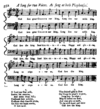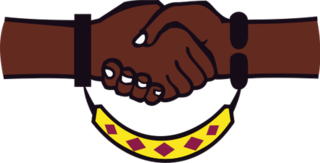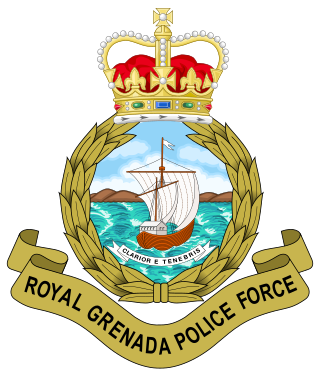The national symbols of Grenada are the symbols that are used in Grenada and abroad to represent the country and its people. Prominent examples include Grenada's coat of arms as a Grenadian symbol and its penny.
The national symbols of Grenada are the symbols that are used in Grenada and abroad to represent the country and its people. Prominent examples include Grenada's coat of arms as a Grenadian symbol and its penny.
| Symbol | image | Started on |
|---|---|---|
| Royal Anthem |  God Save the King | |
| Royal Cypher |  | |
| Patriotic Symbols |  Nutmeg | |
| National flag |  | |
| Coat of arms | ||
| National anthem | Hail Grenada | |
| Motto | Ever Conscious of God We Aspire, Build and Advance as One People | |
| National colours | Red yellow green | |
| National dish | Oil down | |
| Floral emblem |  Bougainvillea | |
| National Bird |  Grenada dove |
The history of Grenada in the Caribbean, part of the Lesser Antilles group of islands, covers a period from the earliest human settlements to the establishment of the contemporary nationstate of Grenada. First settled by indigenous peoples, Grenada by the time of European contact was inhabited by the Caribs. British colonists killed most of the Caribs on the island and established plantations on the island, eventually importing African slaves to work on the sugar plantations.

The economy of Grenada is largely tourism-based, small, and open economy. Over the past two decades, the main thrust of Grenada's economy has shifted from agriculture to services, with tourism serving as the leading foreign currency earning sector. The country's principal export crops are the spices nutmeg and mace. Other crops for export include cocoa, citrus fruits, bananas, cloves, and cinnamon. Manufacturing industries in Grenada operate mostly on a small scale, including production of beverages and other foodstuffs, textiles, and the assembly of electronic components for export.

St. George's is the capital of Grenada. The city is surrounded by a hillside of an old volcano crater and is located on a horseshoe-shaped harbour.

Grenada County is a county located in the U.S. state of Mississippi. As of the 2020 Census, the population was 21,629. Its county seat is Grenada. The county was named for Granada, Spain. Its western half is part of the Mississippi Delta. Cotton cultivation was important to its economy well into the 20th century.

Grenada is a city in Grenada County, Mississippi, United States. Founded in 1836, the population was 13,092 at the 2010 census. It is the county seat of Grenada County.

The United States and a coalition of six Caribbean countries invaded the small island nation of Grenada, 100 miles (160 km) north of Venezuela, at dawn on 25 October 1983. Codenamed Operation Urgent Fury by the U.S. military, it resulted in military occupation within a few days. It was triggered by strife within the People's Revolutionary Government, which led to the house arrest and execution of the previous leader and second Prime Minister of Grenada, Maurice Bishop, and to the establishment of the Revolutionary Military Council, with Hudson Austin as chairman. Following the invasion there was an interim government appointed, and then general elections held in December 1984.

The flag of Grenada consists of two yellow triangles at the top and bottom and two green triangles at the hoist and fly. These are surrounded by a red border charged with six five-pointed yellow stars – three at the top centre and three at the bottom centre – along with an additional star on a red disc at the centre and a nutmeg at the hoist triangle. Adopted in 1974 to replace the temporary design used since the islands became an Associated State of the United Kingdom, it has been the flag of Grenada since the country gained independence that year. The representation of a nutmeg is symbolic of the islands' primary export, and was the one feature from the previous flag that was preserved.

The New Joint Endeavor for Welfare, Education, and Liberation, or New JEWEL Movement (NJM), was a Marxist–Leninist vanguard party in the Caribbean island nation of Grenada that was led by Maurice Bishop.
The Grenada national football team represents Grenada in international football, and is controlled by the Grenada Football Association, a member of the Caribbean Football Union of CONCACAF. The team is nicknamed The Spice Boys, a reference to the country being nicknamed the "Island of Spice" or the "Spice Isle".

The People's Revolutionary Government (PRG) was proclaimed on 13 March 1979 after the Marxist–Leninist New Jewel Movement overthrew the government of Grenada in a revolution, making Grenada the only socialist state within the Commonwealth. In Grenada, the revolution is referred to as the March 13th Revolution of 1979 or simply as “The Revolution”. The government suspended the constitution and ruled by decree until a factional conflict broke out, culminating in an invasion by the United States on 25 October 1983.

The Scout Association of Grenada, the national Scouting organization of Grenada, was founded in 1924, and became a member of the World Organization of the Scout Movement in 1979. This coeducational association has 1,378 members as of 2011.

Grenada first competed at the Olympic Games in 1984, and has participated in each Summer Olympic Games since then. Grenada won its first medal in 2012, a gold in athletics. The Grenada Olympic Committee was formed in 1984 and recognized in the same year.

The Royal Grenada Police Force (RGPF) is responsible for law enforcement in Grenada. The RGPF enforces criminal, immigration, and maritime laws. It is also held responsible for seaport security and fire services. With 14 police stations and over 940 staff members, the force responds to over 15,000 crimes and incidents per year. The Royal Grenada Police Force also has a paramilitary force for national defense.

Grenada – United States relations are bilateral relations between Grenada and the United States. The United States recognized Grenada on 7 February 1974, the same day as Grenada got independence from the United Kingdom of Great Britain and Northern Ireland. These nations formally established diplomatic relations on 29 November 1974.

The following outline is provided as an overview of and topical guide to Grenada:

The monarchy of Grenada is a system of government in which a hereditary monarch is the sovereign and head of state of Grenada. The current Grenadian monarch and head of state, since 8 September 2022, is King Charles III. As sovereign, he is the personal embodiment of the Grenadian Crown. Although the person of the sovereign is equally shared with 14 other independent countries within the Commonwealth of Nations, each country's monarchy is separate and legally distinct. As a result, the current monarch is officially titled King of Grenada and, in this capacity, he and other members of the royal family undertake public and private functions domestically and abroad as representatives of Grenada. However, the King is the only member of the royal family with any constitutional role.

Grenada is an island country of the West Indies in the eastern Caribbean Sea. The southernmost of the Windward Islands, Grenada is directly south of Saint Vincent and the Grenadines and about 100 miles (160 km) north of Trinidad and the South American mainland.

The COVID-19 pandemic in Grenada is part of the ongoing global viral pandemic of coronavirus disease 2019 (COVID-19), which was confirmed to have reached Grenada on March 22, 2020. Despite lockdowns and social distancing protocols, it appeared to have reached the level of community spread within one month. However, cases continued to decline through May, and by June 18, 2020, the Ministry of Health declared zero active cases — indicating Grenada's efforts were successful in ridding the country of the virus. This situation continued until December 2020, when a small outbreak occurred, associated with the Sandals Resort and a "travel corridor" that did not require guests to be tested for COVID-19. However, this incident notwithstanding, the vast majority of cases in Grenada through August 2021 were those caught during quarantine confinement of incoming travelers. In August 2021, an outbreak of the delta variant resulted in substantial community spread and nearly 200 deaths. By mid-October 2021, however, the outbreak was largely contained and life returned to normal, although a small amount of community spread continued through the rest of 2021.